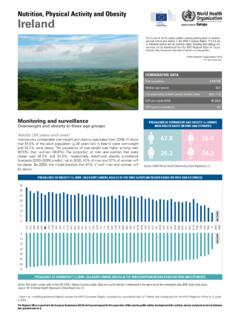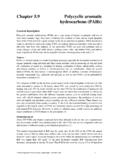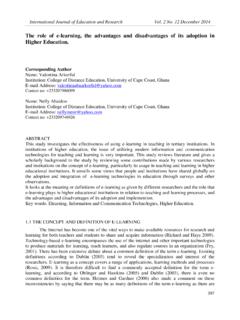Transcription of What are the advantages and disadvantages of …
1 What are the advantages and disadvantages of restructuring a health care system to be more focused on primary care services? January 2004 ABSTRACT This is a Health Evidence Network (HEN) synthesis report on the advantages and disadvantages of restructuring a health care system to be more focused on primary care services. The available evidence demonstrates some advantages for health systems that rely relatively more on primaryhealth care and general practice in comparison with systems more based on specialist care in terms of betterpopulation health outcomes, improved equity, access and continuity and lower cost. This report is HEN s response to a question from a decision-maker. It provides a synthesis of the best available evidence, including a summary of the main findings and policy options related to the issue. HEN, initiated and coordinated by the WHO Regional Office for Europe, is an information service for publichealth and health care decision-makers in the WHO European Region.
2 Other interested parties might also benefitfrom HEN. This HEN evidence report is a commissioned work and the contents are the responsibility of the authors. They do not necessarily reflect the official policies of WHO/Europe. The reports were subjected to international review, managed by the HEN team. When referencing this report, please use the following attribution: Atun R (2004) What are the advantages and disadvantages of restructuring a health care system to be more focused on primary care services? Copenhagen, WHO Regional Office for Europe (Health Evidence Network report; , accessed 20 January 2004). Keywords DELIVERY OF HEALTH CARE ORGANIZATION AND ADMINISTRATION PRIMARY HEALTH CARE EVALUATION STUDIES QUALITY OF HEALTH CARE PATIENT SATISFACTION HEALTH SERVICES ACCESSIBILITY COST-BENEFIT ANALYSIS DECISION SUPPORT TECHNIQUES EUROPE Address requests about publications of the WHO Regional Office to.
3 By e-mail (for copies of publications) (for permission to reproduce them) (for permission to translate them) by post Publications WHO Regional Office for Europe Scherfigsvej 8 DK-2100 Copenhagen , Denmark World Health Organization 2004 All rights reserved. The Regional Office for Europe of the World Health Organization welcomes requests for permission to reproduce or translate its publications, in part or in full. The designations employed and the presentation of the material in this publication do not imply the expression of any opinion whatsoever on the part of the World Health Organization concerning the legal status of any country, territory, city or area or of its authorities, or concerning the delimitation of its frontiers or boundaries.
4 Where the designation country or area appears in the headings of tables, it covers countries, territories, cities, or areas. Dotted lines on maps represent approximate border lines for which there may not yet be full agreement. The mention of specific companies or of certain manufacturers products does not imply that they are endorsed or recommended by the World Health Organization in preference to others of a similar nature that are not mentioned. Errors and omissions excepted, the names of proprietary products are distinguished by initial capital letters. The World Health Organization does not warrant that the information contained in this publication is complete and correct and shall not be liable for any damages incurred as a result of its use. The views expressed by authors or editors do not necessarily represent the decisions or the stated policy of the World Health Organization. 2 What are the advantages and disadvantages of restructuring a health care system to be more focused on primary care services?
5 WHO Regional Office for Europe s Health Evidence Network (HEN) January 2004 The 4 4 Policy Sources for this Defining primary and specialist Findings from research and other Population health and aggregate health Equity and Quality and efficiency of Cost Patient 9 11 Annex 1. Defining primary and specialist 3 What are the advantages and disadvantages of restructuring a health care system to be more focused on primary care services? WHO Regional Office for Europe s Health Evidence Network (HEN) January 2004 Summary The issue Governments are searching for ways to improve the equity, efficiency, effectiveness, and responsiveness of their health systems. In recent years there has been an acceptance of the important role of primary health care in helping to achieve these aims. However, there have been no systematic reviews on primary care versus specialist-oriented systems, nor has the case for primary health care been firmly established.
6 This review presents the evidence for the advantages and disadvantages of restructuring a health care system on primary care services. It is based on a rapid but systematic review of key sources of published literature. The evaluation of evidence is complex for a number of reasons, including differing definitions of services, staff and the boundaries between primary and secondary care, changing organizational structures, and an increasing reliance on primary care teams. No studies were found that specifically addressed the advantages of health care systems relying on specialists. Findings International studies show that the strength of a country s primary care system is associated with improved population health outcomes for all-cause mortality, all-cause premature mortality, and cause-specific premature mortality from major respiratory and cardiovascular diseases.
7 This relationship is significant after controlling for determinants of population health at the macro-level (GDP per capita, total physicians per one thousand population, percentage of elderly) and micro-level (average number of ambulatory care visits, per capita income, alcohol and tobacco consumption). Furthermore, increased availability of primary health care is associated with higher patient satisfaction and reduced aggregate health care spending. Studies from developed countries demonstrate that an orientation towards a specialist-based system enforces inequity in access. Health systems in low income countries with a strong primary care orientation tend to be more pro-poor, equitable and accessible. At the operational level, the majority of studies comparing services that could be delivered as either primary health care or specialist services show that using primary care physicians reduces costs, and increases patient satisfaction with no adverse effects on quality of care or patient outcomes.
8 The majority of studies analysing substitution of some services from secondary to primary care showed some such shifts to be more cost-effective. The expansion of primary health care services may not always reduce costs because it ends up identifying previously unmet needs, improves access, and tends to expand service utilization. Policy considerations The available evidence demonstrates some advantages for health systems that rely relatively more on primary health care and general practice in comparison with systems more based on specialist care in terms of better population health outcomes, improved equity, access and continuity and lower cost. However, a stronger evidence base is needed to make the evidence available universally applicable. 4 What are the advantages and disadvantages of restructuring a health care system to be more focused on primary care services? WHO Regional Office for Europe s Health Evidence Network (HEN) January 2004 The author of this HEN synthesis report is: Dr Rifat Atun Director, Centre for Health Management Tanaka Business School Imperial College London South Kensington Campus London SW7 2AZ Tel: +44 (0) 20 7594 9160 Fax: +44 (0) 20 7823 7685 E-mail: Introduction Globally, governments are searching for ways to improve equity, efficiency, effectiveness, and responsiveness of their health systems.
9 The WHO World Health Report identifies many countries that fall short of their performance potential (1). There is no agreement on optimum structures, content, and ways to deliver cost-effective services to achieve health gain for the population. In recent years there has been an acceptance of the role of primary health care (PHC) in providing cost effective health care (2, 3, 4). However, the advantages and disadvantages of health care systems that rely on medical specialists versus the systems that rely more on general practitioners and primary health care have not been systematically reviewed or a case for primary health care firmly established. This paper assesses the empirical evidence for them through a review of studies published in the period 1980-2003. A discussion of the generalizability of findings follows. It also explores definitional issues related to primary health care. In this review, the terms primary health care, primary care and general practice are used interchangeably.
10 Generally, primary care and general practice refer to primary medical care, which in the WHO definition of primary health care form only a part of a greater set of aims and activities, as described in the next section. This study was inherently complex due to a number of factors. There are varied definitions of the scope and role of general practice, primary care, primary health care and specialists. For instance, a primary care team can vary from a community nurse, a feldsher or rural general practitioner to a multidisciplinary team of up to 30, comprising specialist nurses, managers, support staff, family medicine and other primary care specialists. The boundaries of primary and secondary care differ among and within countries, making comparison and generalizability of studies particularly challenging. Organizational structures in many countries are changing, giving way to integrated institutions comprising primary and secondary care.



















